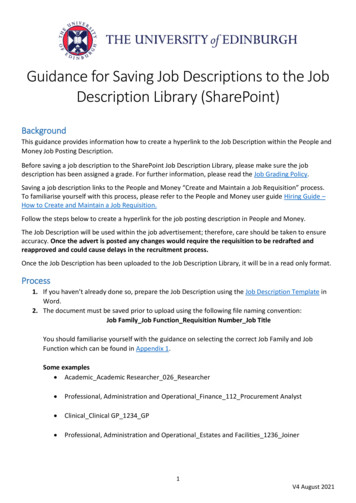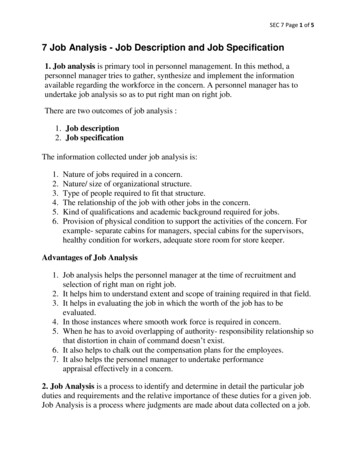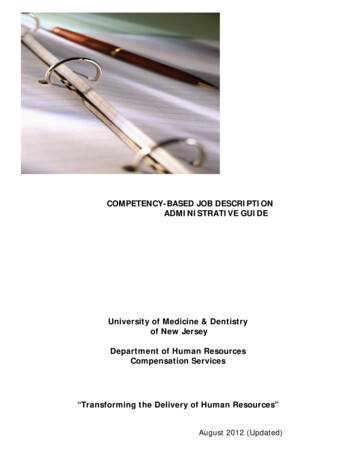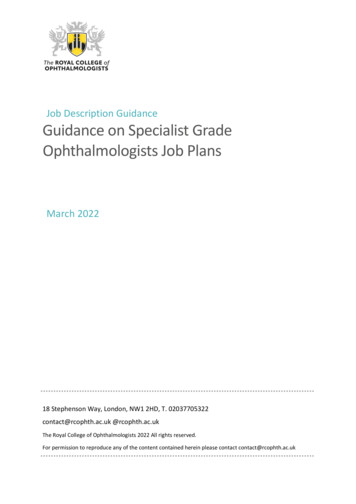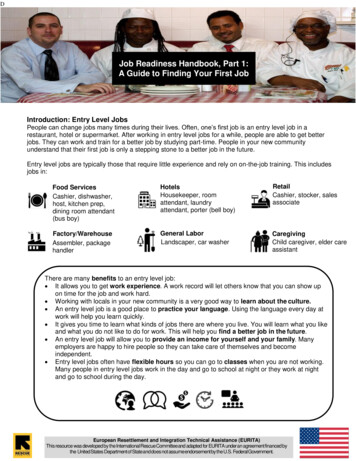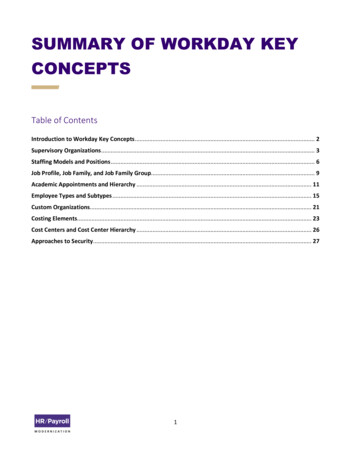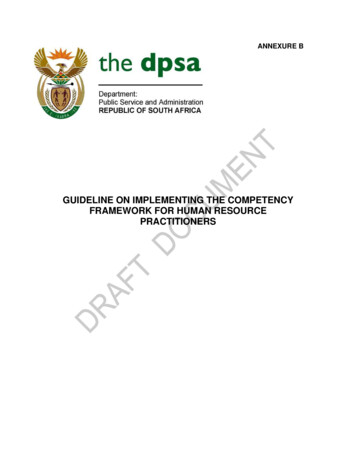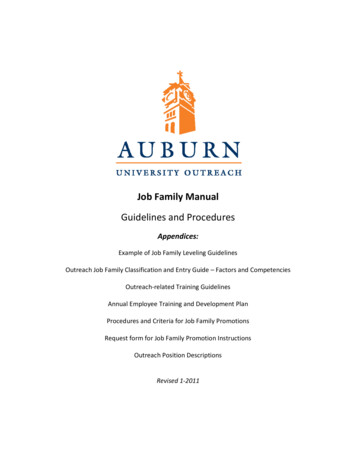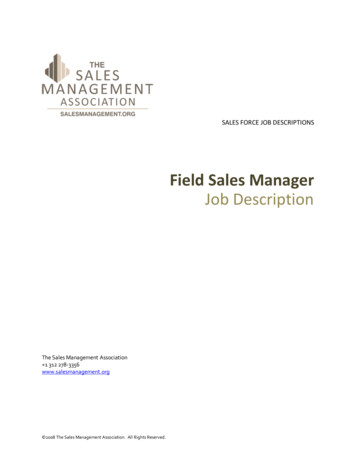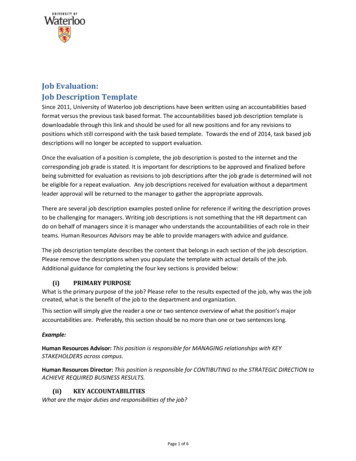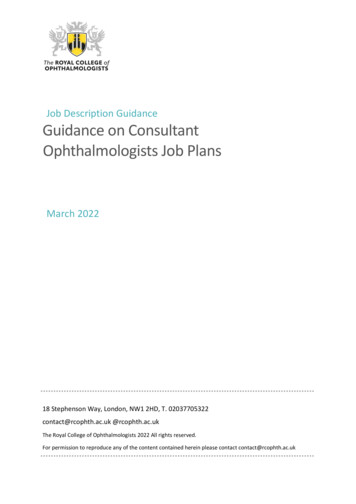
Transcription
Job Description GuidanceGuidance on ConsultantOphthalmologists Job PlansMarch 202218 Stephenson Way, London, NW1 2HD, T. 02037705322contact@rcophth.ac.uk @rcophth.ac.ukThe Royal College of Ophthalmologists 2022 All rights reserved.For permission to reproduce any of the content contained herein please contact contact@rcophth.ac.uk
ContentsSection1. Introduction2. Job descriptionInformation on the employing organisationThe postMedical audit and CPDRevalidationWorkload figuresTime off in lieuMentoringFlexible workingRecommended allocation of PAs for new consultants3. Job plansWorking weekProgrammed activityDirect clinical care (DCC)Supporting Professional Activity (SPA)ResearchOn-callSPAs and part-time postsSPAs for researchAdditional NHS ResponsibilitiesExternal duties4. Person specification5. Additional readingpage34445555566666677889991011Date of review: October 20232022/PROF/4512
1. IntroductionThis guide explains the RCOphth’s guidance and requirements for approving and job plansfor NHS consultant ophthalmologist posts. It does not cover Medical Ophthalmology postswhich should be sent to The Royal College of Physicians (RCP).Council Regional Representatives (RRs) will use this guidance when reviewing jobdescriptions against national standards and criteria; to consider whether the post representsa satisfactory consultant post within the local circumstances of the trust* and in line withrelevant terms and conditions of service.RCOphth approval of job descriptions should be obtained prior to advertising the post.Ophthalmic services should be provided by a suitably trained workforce which can be drawnfrom various professions. The service should be consultant led with adequate support fromother professionals which will include ophthalmologists in training, Associate Specialists,Specialty doctors, Specialist doctors, ophthalmic nurse practitioners, orthoptists,optometrists, clinical scientists, imaging specialists and other eye care professionals.In hospitals where there are fellows, postgraduate students, specialist trainees, specialitydoctors, and undergraduate medical students, consultant sessions are needed both tosupervise training and to provide teaching.No ophthalmic unit should be staffed by a single consultant working in isolation. Smaller eyeunits should have a minimum of two consultants, although experience suggests that theappointment of a third consultant may lead to more sustainably resourced department.Academic honorary consultant appointments will have an appropriate job plan taking intoaccount their academic appointment but retaining the core requirements and adhere toFollett principles.The RCOphth supports the UK Government position that clinical research is a core part ofeffective patient care in the NHS and from 2021 i will create incentives and levers to achievethis including building research into healthcare regulatory requirements for NHS bodies andrevalidation requirements for medical professionals2022/PROF/4513
2. Job descriptionA job description should include:Information on the employing organisation Key servicesCatchment area and populationRegional and national servicesUniversity links, support and resources for researchDevelopment plansManagement Structureo Tertiary centre, teaching hospital or DGHo On-site serviceso Relationship with other hospitalso Development plan The DepartmentManagement structureWork of the departmentLocation/s care is delivered in and where the post holder will workNumbers and composition of medical staff: (consultants, trainees, specialtydoctors) it should be clear what staff will be available to support theappointee and these should be defined.o Support staff: (orthoptists, optometrists, medical photographers, technicians)o Relationship with other departmentso Clinical activity - contracts e.g., outpatient attendance figureso Facilities available: inpatient (number of beds), day case, theatres, outpatient(general and special interest), accident and emergency, diagnostic facilities Secretarial/IT/office facilities - a commitment to defined secretarial support andan adequately equipped office, which may be shared or involve ‘hot desking’,including defined availability of information technology (IT) facilities. If there islack of secretarial support, then additional PAs will be required for patientadministration. Appropriate facilities and quiet environment for telemedicine and virtual clinic.ooooThe post Job title, whether whole or part-time and employing authority. The main duties and responsibilities of the post, including information on theclinical, teaching, research and administrative elements. Where a sub-specialty is specified the equipment and infrastructure relevant tothat specialty should be indicated Clinical director/manager to whom responsible; names and grades of othermembers of staff. Details of all likely clinical commitments including fixed sessions, supportingprofessional activities and duties at other establishments. Details of out-of-hours and unsocial hours responsibilities, including rotacommitments, where appropriate.2022/PROF/4514
Timetable: This may be indicative, the actual timetable should be provided to thesuccessful candidate not later than four weeks prior to taking up of the position.This should be done in conjunction and agreed by the consultant. Details of any other duties including the supervision and support of other staff,teaching, administrative and research requirements or opportunities. Theprovision to offer a named mentor to new consultants on appointment. Requirements to participate in audit and clinical governance under localarrangements. Management responsibilities.Medical audit and CPD a statement on expectations regarding medical audit a statement on expectations for continuing professional development (CPD). Asuitable form of wording is: ‘The trust supports the requirements for continuingprofessional development (CPD) as laid down by the Royal College ofOphthalmologists and is committed to providing time and financial support forthese activities.’RevalidationThe trust should ensure it has the required arrangements in place for appraisal as laid downby the RCOphth, to ensure that all doctors have an annual appraisal with a choice of trainedappraiser and are supported when going through the revalidation process.Workload figuresPotential appointees like to have some idea of the inpatient and outpatient workload (newand follow-up) of the department that they will be joining, and the expectations of thepersonal workload for the job. Emergency cover arrangements/policies should be included.Time off in lieuThere are concerns about doctors not being allowed time off in lieu (such as for weekendworking), and the Trust should address rest requirements, particularly for new specialistdoctors.MentoringThe job description should always include a reference to information about access tomentoring for new consultant development for newly appointed consultants.The RCOphth believes that every newly appointed consultant should be offeredopportunities for new consultant development to aid transition into their new role. Theseopportunities should include mentoring (departmental, trust or external), leadershipdevelopment (through teaching/training supported by practical opportunities), networking,education and personal wellbeing. The RCOphth is not prescriptive as to how the hospital ortrust does this, as it may vary by trust or specialty. However, the RCOphth would like to seethat this opportunity is available to all newly appointed consultants.The new consultant development arrangements for the person recommended forappointment at the Advisory Appointments Committee (AAC) should be discussed andagreed by the AAC as part of its decision-making process.2022/PROF/4515
Flexible workingIt is desirable to have a statement in the job description and advert that says how thattrust/department embraces flexible working. The job should be advertised as available tofulltime (FT)/less than fulltime (LTFT) applicants. In the construction of the job description,consideration should be made as to the key core elements of the job, and therefore how thejob could be adapted for someone who wishes to work LTFT or flexibly. All job advertsshould then state that applications are welcome from individuals who wish to workLTFT/flexibly.Recommended allocation of PAs for new consultantsTo comply with the new consultant contract there should be a framework of 10 PAs for afull-time post.When a job plan is over 10 PAs, particularly when including on-call commitments, it shouldbe made clear in the job description that any additional time over 10 PAs is approved on thecondition that the applicant has agreed to the proposed job plan at interview.The weekly timetable in the job description should clearly define whether a session is DCC orSPA and where the DCC administration time is to take place.The exact number of fixed clinical sessions may also depend upon other commitments suchas a particularly onerous workload or significant additional responsibilities.3. Job plansWorking weekA standard full-time working week based on a job plan containing ten programmedactivities.Programmed activityProgrammed activity (PA) means a scheduled period, normally equivalent to four hours(which may be equated to three hours in premium time), during which a doctor undertakescontractual and consequential services. Sessions fall into two categories: Direct Clinical Care(DCC) and Supporting Professional Activities (SPAs).Direct clinical care (DCC)Assuming a standard 10 Programmed Activity (PA) contract: a maximum of 7 patient facing/ engagement Direct Clinical Care (DCC) sessions.This may include 3-4 outpatient sessions (including general and special clinics,laser etc) and 2-3 theatre sessions (or treatment session for medicalophthalmologists) although less than 2 theatre sessions may be appropriate forposts with a subspecialist interest in some areas Telemedical consultations, telephone consultations, virtual clinic reviews, adviceand guidance and clinical triage should be considered as patient engagementsessions. These sessions may include clinical administration time within thetemplate for that session. Appropriate DCC PAs to reflect travel time should be stated in the job plan e.g.,offsite clinics/ travel between hospitals etc.2022/PROF/4516
A minimum of 1 session for patient clinical administration (Direct Clinical Caresession). Being able to triage referrals, dictate letters, look up results ofinvestigations ordered, answering GP and patient enquiries etc. is crucial topatient care. If there is lack of secretarial support, additional PAs will be requiredfor patient administration. There are no specific or guidance on the appropriateamount of clinical administration or how to calculate it. However, it is likely thatabout 60 minutes (0.25 PA) would be reasonable for each four-hour clinic whereit is not already built into the template. It is preferably that this time beconsolidated rather than divided into small additional amounts following orpreceding clinics. Unless agreed by all parties, multiple short periods of DCCclinical administration are unlikely to be effective.Supporting Professional Activity (SPA) A minimum of two Supporting Professional Activity (SPA) sessions, 1.5 of which isto allow for activities such as CPD, audit, research, teaching, appraisal andrevalidation. The RCOphth recommends 0.25 PAs for being an educationalsupervisor (per trainee). Appropriate allocations for other supporting activitiesshould be given. All other additional duties e.g., management, appraising, College Tutor anddeanery roles should also be recognised in a job plan and appropriate PAs agreedduring the job planning process. Duties for external bodies e.g., College work arenot always remunerated but it is important for Trusts to recognise theimportance of external duties which benefit the NHS and allow doctors leave toprofessional leave to take on these roles.The RCOphth along with the Academy of Medical Royal Colleges promoted the value ofincluded 2.5 SPAs within a job plan.In Wales, the Welsh consultant contract mandates a DCC: SPA split of 7:3 for direct clinicalcare to supporting professional activities.Jobs with 1.5 SPAs would be considered clinical only, with no commitment to teaching orresearch and are not typically appropriate to consultant level appointments.Development within Supporting Professional Activities and appropriate application will – inthe longer term – not only benefit the appointee but also that person’s ability to developclinical services.ResearchTrusts should use job planning to protect time for clinical research within the SPA allocationwhile maintaining a minimum of 1.5 SPA for appraisal/revalidation. In future trusts shouldmove towards including patient-facing research within the direct clinical care (DCC)allocation.2022/PROF/4517
On-callIt is expected that the frequency and category is stated.The on call commitment is remunerated as a percentage uplift in salary as category A or BThe employing organisation will determine the category of the consultant’s on-call duties forthese purposes by making a prospective assessment of the typical nature of the responsethat the consultant is likely to have to undertake when called during an on-call period. Thisassessment will consider the nature of the calls that the consultant typically receives whilston-call. The two categories are:Category A: this applies where the consultant is typically required to return immediately tosite when called or has to undertake interventions with a similar level of complexity to thosethat would normally be carried out on site, such as telemedicine or complex telephoneconsultations;Category B: this applies where the consultant can typically respond by giving telephoneadvice and/or by returning to work later.The supplements beingFrequency of rotacommitmentHigh frequency:1 in 1 to 1 in 4Medium frequency:1 in 5 to 1 in 8Low frequency:1 in 9 or less frequentValue of availability supplement as a percentage offull-time basic salaryCategory ACategory B8.0%3.0%5.0%2.0%3.0%1.0%In addition there may be Direct Clinical Care PA allocation calculated by a diary exercise forpredictable and unpredictable on call and this must be reflected within the job plan.It would be helpful to include information on the number of patients that a consultantshould expect to see, and on the times that he or she should expect to be in the hospital.SPAs and part-time postsThe British Medical Association (BMA) and AoMRC have guidance on how many SPAs shouldbe provided for a consultant who is working less than 10 PAs. LTFT doctors requireproportionately more SPA time than full-time posts, for CPD in particular. The principle isthat the consultant should be able to undertake all teaching, audit, and clinical governanceactivities within the time allocated for supporting activities as follows:It is unlikely that a less than full time doctor can fulfil revalidation requirements whileworking less than 1 SPA, and this is considered essential.2022/PROF/4518
For consultants who have a contract for working fewer than 7 PAs, a minimum of 1 SPAsshould be within that allocation in the job plan for mandatory training, appraisal, audit andrevalidation. It would be expected that further SPA would within that allocation foreducational supervisor, appraiser, research and other activities as required.A job plan with 7 Pas and above would reasonably be expected that there would be 1.5SPAconsidered essential for mandatory training, appraisal, audit and CPD/revalidation. Is wouldbe expected that further SPA would be allocated for educational supervisor, appraiser,research and other activities as required.Revalidation is a requirement and is to include one’s whole practice. Therefore, those whohave more than one employment may proportionally have the SPA’s from differentemployers such as another NHS Trust, University, Private Practice. Taking this into accountthe SPA allocation should use the same principles.On occasion there are job plans of much fewer PA’s. This may be as part of multipleemployments and should be treated as indicated in the previous paragraph and this shouldbe made clear at the time the job plan is submitted to the college.Where a post is of few PAs and it is a sole ophthalmology activity then this should be dealtwith in the same way at those on less than 7 PAs. These consultant positions need carefulconsideration on an individual basis,SPAs for researchJobs that have a defined academic or university component are usually clear.Where SPAs are expected to contain a contribution to research that is specified, anappropriate time commitment within SPA should be included in the job plan (or in the futureDCC where patient facing) . This allocation will depend on the size of the research study andindividual time requirement. There should be local protocols for this to ensure equity andtransparency within the trust.Additional NHS ResponsibilitiesAdditional NHS Responsibilities are special responsibilities within the employing organisationnot undertaken by the generality of doctors, which are agreed between the doctor and theemployer and which cannot be absorbed in the time set aside for supporting professionalactivities. These could include, for example being a clinical manager, clinical governance leador clinical audit lead.External dutiesExternal duties are work that not included in the definitions of ‘Direct Clinical Care’,‘Supporting Professional Activities’ and ‘Additional NHS Responsibilities’, and not includedwithin the definition of Fee Paying Services or Private Professional Services. They areundertaken as part of the prospectively agreed job plan by agreement between the doctorand the employing organisation without causing undue loss of clinical time. They mightinclude, for example, trade union duties, reasonable amount of work for the Royal Collegesor Government Departments in the interests of the wider NHS.2022/PROF/4519
4. Person specificationThere should be a person specification that details the essential and desirable qualifications,skills and experience that are required to perform the job.Reference to professional qualifications should be worded to recognise the differentpathways for entry onto the Specialist Register, so it is inclusive of those applicants whohave gained training or qualifications outside the UK.RegistrationQualificationsESSENTIALFull GMC RegistrationFRCOphth or equivalentGeneralMust be on the Specialist Registrar, hold aCertificate of Completion of Training(CCT/CCST) or be within 6 months of obtainingthe CCT.ExperienceClinical training and experience and ability totake full and independent responsibility forclinical care of patients.Experience and training in a speciality areacomplementary to those in the department.AuditExperience of and participation indepartmental audit.Clinical skillsClinical ability and experience to fulfil theclinical role of the postTeachingAbility to teach junior staff andundergraduates where appropriateResearchAbility to contribute to clinical researchdeliveryPersonalAbility to establish good workingrelationships with staff and be able tocommunicate well with patients. Flexibility.ManagementGood organisational skills and timemanagement2022/PROF/451DESIRABLEHigher degreePost CCST FellowshipExperience of riskmanagement.10
5.Additional ltant-contract-2003Consultant contracts and terms of conditions for service for England (2003), Wales (2003)and Northern Ireland (2013), BMAA guide to consultant job planning, BMA and NHS Employers, July 2011 Version 1Concordat between the medical royal colleges and the foundation trust network on theappointment of consultant medical staff, March 2010Compensatory Rest Guidance, BMA, September 2019Medical Care is the online evolution of the well-known RCP publication Consultantphysicians working with patients and offers a practical guide to the planning and provision ofmedical services, February 2017Delivering research for all, expectations and aspirations for the NHS in England, RCPpublication, April 2019BMA part-time and flexible working, last updated 25 April 2019Advice on Supporting Professional Activities in consultant job planning, Academy of MedicalRoyal Colleges (AoMRC), 8 February 20102022/PROF/45111
be made clear in the job description that any additional time over 10 PAs is approved on the condition that the applicant has agreed to the proposed job plan at interview. The weekly timetable in the job description should clearly define whether a session is DCC or SPA and where the DCC administration time is to take place.
